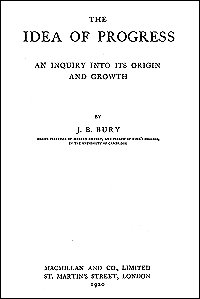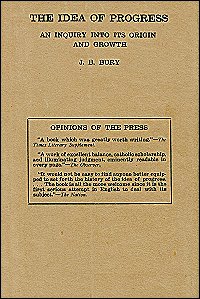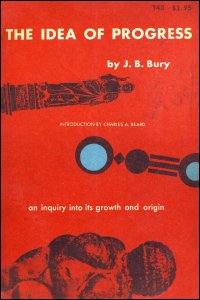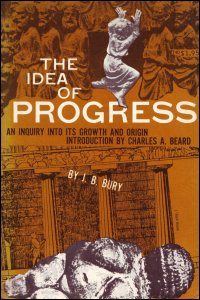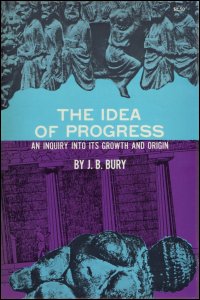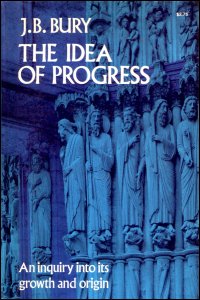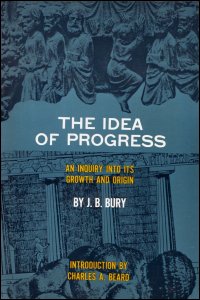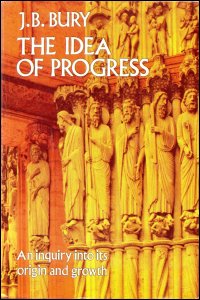J.B.Bury’s works – 1920
—
THE IDEA OF PROGRESS
AN INQUIRY INTO ITS ORIGIN AND GROWTH
—
by John B. Bury
—
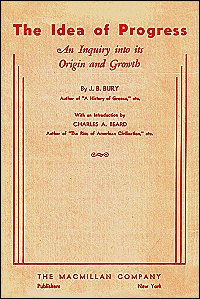 1932 – 1st ed. USA (dust cover) |
||
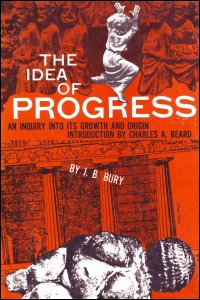 1955 – re-ed. USA (paperback) |
||
—
published by:
- The McMillan and Co., London, 1920, 377 pages
republished by:
- The McMillan and Co., London, 1921, 377 pages
- The McMillan and Co., London, 1928, 377 pages
- The McMillan and Co., New York, 1928, 377 pages [Introduction by Charles Beard]
- Dover Publications, Inc. New York, 1955, 377 pages [Introduction by Charles Beard]
—
—
The idea of progress dominates modern thought to such an extent, that it takes some effort of imagination to realize its relative youth; it is not yet [in 1921] two hundred years old! What is the idea of progress? it means “that civilization gas moved, is moving and will move in a desirable direction”. This definition evidences at once the metaphysical or adventurous character of this idea. Admitting that we can prove the reality of progress in the past and present, we can not prove its indefinite continuance in the future, nor can we prove that humanity will move forever in a desirable direction. Hence belief in progress is an act of faith, but we might as well accept at once the fact that inasmuch as the future is unknown, man can not live without faith. His activity implies some sort of faith. The assumption of progress belongs to the same order of ideas as the belief in Providence or personal immortality. Yet there is a great difference which will be sufficiently illustrated by the fact that the development of the idea of progress is intimately connected with the growth of modern science, the growth of rationalism and the struggle for political and religious liberty.
George Sarton, 1921
—
![]()
——
 John Bagnell Bury |
|
—
 |
| Claude Monet – detail from “Rue Montorgueuil – fête nationale pour la paix et le travail” (30/06/1878) |
—
| 2 copies available: | |
|
 |
|
 |
![]()
—
Enough has been said to show that the Progress of humanity belongs to the same order of ideas as Providence or personal immortality. It is true or it is false, and like them it cannot be proved either true or false. Belief in it is an act of faith.
The idea of human Progress then is a theory which involves a synthesis of the past and a prophecy of the future. It is based on an interpretation of history which regards men as slowly advancing – pedetemtim progredientes – in a definite and desirable direction, and infers that this progress will continue indefinitely. And it implies that, asthe issue of the earth’s great business,
a condition of general happiness will ultimate be enjoyed, which will justify the whole process of civilisation; for otherwise the direction would not be desirable. There is also a further implication. The process must be the necessary outcome of the physical and social nature of man; it must not be at the mercy of any external will; otherwise there would be no guarantee of its continuance and its issue, and the idea of Progress would lapse into the idea of Providence.” …
[J. B. Bury – 1920]
![]()
—
… if we accept the reasonings on which the dogma of Progress is based, must we not carry them to their full conclusion? In escaping from the illusion of finality, is it legitimate to exempt that dogma itself? Must not it, too, submit to its own negation of finality? Will not that process of change, for which Progress is the optimistic name, compel “Progress” too to fall from the commanding position in which it is now, with apparent security, enthroned? ’Έσσεται ήμαρ όταν … A day will come, in the revolution of centuries, when a new idea will usurp its place as the directing idea of humanity. Another star, unnoticed now or invisible, will climb up the intellectual heaven, and human emotions will react to its influence, human plans respond to its guidance. It will be the criterion by which Progress and all other ideas will be judged. And it too will have its successor.
In other words, does not Progress itself suggest that its value as a doctrine is only relative, corresponding to a certain not very advanced stage of civilisation; just as Providence, in its day, was an idea of relative value, corresponding to a stage somewhat less advanced? Or will it be said that this argument is merely a disconcerting trick of dialectic played under cover of the darkness in which the issue of the future is safely hidden by Horace’s prudent god?[J. B. Bury – 1920]
—
TRANSLATIONS:
—
—

—

—
This idea [Progress] means that civilisation has moved, is moving, and will move in a desirable direction. But in order to judge that we are moving in a desirable direction we should have to know precisely what the destination is. To the minds of most people the desirable outcome of human development would be a condition of society in which all the inhabitants of the planet would enjoy a perfectly happy existence. But it is impossible to be sure that civilisation is moving in the right direction to realise this aim.
—
John B. Bury (1861-1927)
—
—
—

